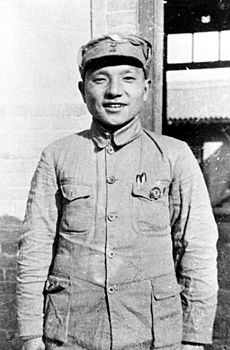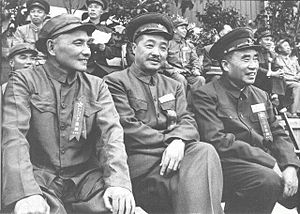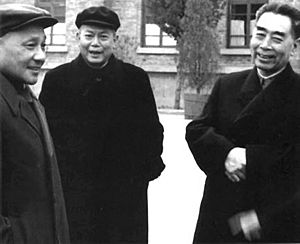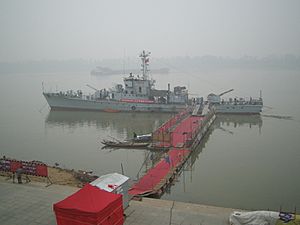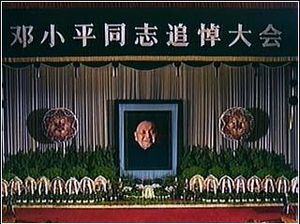Deng Xiaoping facts for kids
Quick facts for kids
Deng Xiaoping
|
|||||||||||||||||||||||||||||||||||||||
|---|---|---|---|---|---|---|---|---|---|---|---|---|---|---|---|---|---|---|---|---|---|---|---|---|---|---|---|---|---|---|---|---|---|---|---|---|---|---|---|
|
邓小平
|
|||||||||||||||||||||||||||||||||||||||
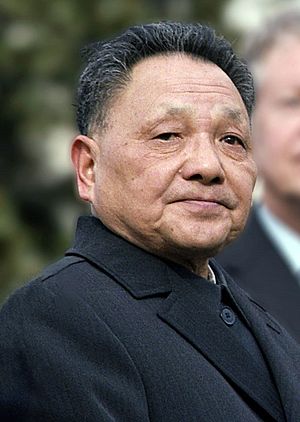
Deng during a visit to the US in 1979
|
|||||||||||||||||||||||||||||||||||||||
| Chairman of the Central Advisory Commission | |||||||||||||||||||||||||||||||||||||||
| In office 13 September 1982 – 2 November 1987 |
|||||||||||||||||||||||||||||||||||||||
| President | Li Xiannian | ||||||||||||||||||||||||||||||||||||||
| Premier | Zhao Ziyang | ||||||||||||||||||||||||||||||||||||||
| Deputy |
|
||||||||||||||||||||||||||||||||||||||
| General Secretary |
|
||||||||||||||||||||||||||||||||||||||
| Preceded by | Office established | ||||||||||||||||||||||||||||||||||||||
| Succeeded by | Chen Yun | ||||||||||||||||||||||||||||||||||||||
| Chairman of the Central Military Commission | |||||||||||||||||||||||||||||||||||||||
| In office Party Commission: 28 June 1981 – 9 November 1989
|
|||||||||||||||||||||||||||||||||||||||
| Deputy |
|
||||||||||||||||||||||||||||||||||||||
| General Secretary |
|
||||||||||||||||||||||||||||||||||||||
| Preceded by | Hua Guofeng | ||||||||||||||||||||||||||||||||||||||
| Succeeded by | Jiang Zemin | ||||||||||||||||||||||||||||||||||||||
| In office State Commission: 6 June 1983 – 19 March 1990
|
|||||||||||||||||||||||||||||||||||||||
| Preceded by | Office established | ||||||||||||||||||||||||||||||||||||||
| Succeeded by | Jiang Zemin | ||||||||||||||||||||||||||||||||||||||
| 3rd Chairman of the Chinese People's Political Consultative Conference | |||||||||||||||||||||||||||||||||||||||
| In office 8 March 1978 – 18 June 1983 |
|||||||||||||||||||||||||||||||||||||||
| Preceded by | Zhou Enlai (until 1976) | ||||||||||||||||||||||||||||||||||||||
| Succeeded by | Deng Yingchao | ||||||||||||||||||||||||||||||||||||||
|
|||||||||||||||||||||||||||||||||||||||
| Personal details | |||||||||||||||||||||||||||||||||||||||
| Born | 22 August 1904 Guang'an, Sichuan, Qing Empire |
||||||||||||||||||||||||||||||||||||||
| Died | 19 February 1997 (aged 92) Beijing, China |
||||||||||||||||||||||||||||||||||||||
| Political party | Chinese Communist (from 1924) | ||||||||||||||||||||||||||||||||||||||
| Spouses |
Zhang Xiyuan (张锡瑗)
(m. 1928; died 1929)Jin Weiying (金维映)
(m. 1931–1939)Zhuo Lin
(m. 1939) |
||||||||||||||||||||||||||||||||||||||
| Relations | Deng Zhuodi (grandson) | ||||||||||||||||||||||||||||||||||||||
| Children |
|
||||||||||||||||||||||||||||||||||||||
| Signature |  |
||||||||||||||||||||||||||||||||||||||
| Military service | |||||||||||||||||||||||||||||||||||||||
| Allegiance | People's Republic of China | ||||||||||||||||||||||||||||||||||||||
| Branch/service |
|
||||||||||||||||||||||||||||||||||||||
| Years of service |
|
||||||||||||||||||||||||||||||||||||||
| Rank |
|
||||||||||||||||||||||||||||||||||||||
| Unit |
|
||||||||||||||||||||||||||||||||||||||
| Battles/wars | |||||||||||||||||||||||||||||||||||||||
|
Central institution membership
1975–1976, 1977–1987: 10th, 11th, 12th Politburo Standing Committee
1956–1967: 8th Politburo Standing Committee 1975–1976, 1977–1987: 10th, 11th, 12th Politburo 1956–1967: 8th Politburo 1945–1967, 1973–1976, 1977–1987: 7th, 8th, 10th, 11th, 12th Central Committee 1954–1967, 1973–1976, 1977–1989: 8th, 10th, 11th, 12th, 13th Central Military Commission 1978–1997: 5th, 6th, 7th, 8th National People's Congress 1959–1964: 2nd National People's Congress Other political offices held
1977–1982: Vice Chairman, Central Committee
1977–1980: 1st-ranked Vice Premier 1975–1976: Vice Chairman, Central Committee 1975–1976: 1st-ranked Vice Premier 1973–1975: Vice Premier 1964–1965: Head, Organization Department 1954–1967: Vice Premier 1953–1954: Director, Office of Communications Military offices held
1977–1981: Vice Chairman, Central Military Commission
1975–1976: Vice Chairman, Central Military Commission 1954–1967: Vice Chairman, National Defense Commission |
|||||||||||||||||||||||||||||||||||||||
Deng Xiaoping (born August 22, 1904 – died February 19, 1997) was a very important leader in China. He was a revolutionary, a military commander, and a statesman. From 1978 to 1989, he was the most powerful leader of the People's Republic of China. After Mao Zedong died in 1976, Deng slowly gained power. He then led China through big changes, moving its economy towards a market system. Because of his work, he is known as the "Architect of Modern China." He helped China become the world's second-largest economy by 2010.
Deng was born in Sichuan province. In the 1920s, he studied and worked in France. There, he became a follower of Marxism and joined the Communist Party of China (CCP) in 1924. He also studied in Moscow. When he returned to China, he became a political leader in the Chinese Red Army. Deng played a big role in important events like the Long March and the Chinese Civil War. After China was founded in 1949, he helped the CCP take control of different regions. He later moved to Beijing to work in the central government.
In the 1950s, Deng helped manage China's economy. He worked under Chairman Mao Zedong and Premier Zhou Enlai. However, his ideas about the economy were different from Mao's. Because of this, he was removed from power twice during the Cultural Revolution (1966–1976).
After Mao's death in 1976, Deng became China's main leader in 1978. China was in a difficult state after the Cultural Revolution. Deng started programs to bring the country back to order. He brought back the national college entrance exam and began the "Reform and Opening-up" policy. This policy created special economic zones and opened China to the world. In 1979, China started official relations with the United States. Deng was the first Chinese leader to visit the US. He also introduced political reforms, like setting term limits for government officials. In the 1980s, he supported the one-child policy and improved education and science. Deng also suggested the "One Country, Two Systems" idea for Hong Kong and Macau. This idea would allow them to keep their own systems after returning to China.
Deng's reforms changed China from a planned economy to one that was more open to foreign investment. This helped China become one of the fastest-growing economies. He combined socialist ideas with free market practices, calling it "socialism with Chinese characteristics." Even though he was never the official head of state or party leader, he was seen as the "core" of China's second generation of leaders. Time magazine named him Person of the Year in 1978 and 1985. He was criticized for the military action during the Tiananmen Square protests of 1989. However, he was also praised for continuing his reforms and for the return of Hong Kong and Macau to China.
Contents
Early Life and Family Background
Deng Xiaoping was born on August 22, 1904, in Guang'an, Sichuan province. His family had lived in Sichuan for many generations. Deng's father, Deng Wenming, was a landowner who had studied law. He was well-known in his local area. Deng's mother died when he was young. He grew up with three brothers and three sisters.
Deng started school at age five. His first teacher changed his given name to "Xixian," which means "to aspire to goodness."
Deng had three wives. His first wife died young after giving birth to their child, who also died. His second wife left him during a difficult political time. His third wife, Zhuo Lin, joined the Communist Party in 1938. They married in 1939 and had five children: three daughters and two sons.
Education and Early Career Abroad
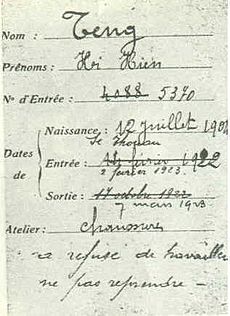
In 1919, Deng graduated from school in Chongqing. He then traveled to France with 80 schoolmates. They were part of a work-study program. Deng was only 15 years old, the youngest in the group. His father supported his decision to study abroad. Deng wanted to "learn knowledge and truth from the West to save China." He knew China needed modern education to improve.
In France, Deng attended middle schools briefly. But he spent most of his time working. He worked in a Renault factory and as a fitter at a steel plant. Later in his life, during the Cultural Revolution, he worked as a fitter again and showed he still had the skill.
In France, Deng met other future Chinese Communist leaders. These included Zhou Enlai and Chen Yi. In 1923, he joined the Chinese Communist Youth League in Europe. He then joined the Chinese Communist Party in 1924. In 1926, Deng went to the Soviet Union to study at Moscow Sun Yat-sen University.
Returning to China and Early Activism
In late 1927, Deng returned to China. He joined the army of Feng Yuxiang, a military leader. At that time, the Soviet Union supported an alliance between Communists and Nationalists. Deng was part of this effort.
However, the alliance broke apart. Deng had to flee areas controlled by the Nationalists. In 1929, he led a local uprising in Guangxi province against the Nationalist government. This uprising failed. Deng then moved to the Communist base in Jiangxi.
Rising in Politics
Deng became deeply involved in the Communist movement in China. Some historians say he was more of a nationalist than a strict Marxist. He wanted China to be strong and equal to other world powers. He saw the Communist revolution as the best way to achieve this.
Early Roles and the Long March
After leaving Feng Yuxiang's army, Deng went to Wuhan, where the Communists had their headquarters. He started using the name "Xiaoping." He quickly gained important positions in the party. He also met Mao Zedong for the first time.
Between 1927 and 1929, Deng lived in Shanghai. He helped organize protests, which were often stopped by the Nationalist government. Many Communists died during these years. This allowed Deng to rise quickly in the party.
In 1929, Deng joined the military fight against the Nationalists in Guangxi. The Nationalist forces were much stronger. In 1931, Deng left the Communist army. His official biography says he was ordered to leave. This event was later used against him during the Cultural Revolution.
In 1931, Deng became the Party Committee secretary in Ruijin, a city in the "Jiangxi Soviet" area. This was an early Communist-controlled region. Mao Zedong believed in focusing on rural peasants for the revolution. Deng supported Mao's ideas. This led to Deng being removed from his propaganda job. However, the Jiangxi Soviet was a successful example of Communist rule in the countryside.
In October 1934, the Communists had to leave Jiangxi. This began the famous Long March. About 100,000 soldiers started the journey. Only about 8,000 to 9,000 survived a year later. During the Zunyi Conference early in the Long March, Mao Zedong became the new leader of the Chinese Communist Party. Deng became an important figure again.
War Against Japan and Nationalists
The Japanese invasion in 1937 started the Second Sino-Japanese War. Deng stayed in the Communist-controlled areas in the north. He became a political leader in the Communist army. He worked closely with Liu Bocheng.
Deng spent most of the war fighting the Japanese. He also visited Yan'an, where Mao had set up the Communist Party's main base. In 1939, he married Zhuo Lin in Yan'an. Deng was seen as a "revolutionary veteran" because of his role in the Long March. He also played a key part in the Hundred Regiments Offensive.
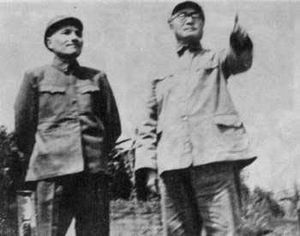
After Japan's defeat in World War II, peace talks between the Nationalists and Communists failed. The Chinese Civil War began again. Deng played a crucial role as a political leader. He helped the Communist army, now called the People's Liberation Army, take control of more territory. He also helped spread Mao Zedong's ideas. His experience and leadership put him in a strong position for power after the Communists won the war.
Political Career Under Mao
Local and Central Government Roles
On October 1, 1949, Deng attended the founding of the People's Republic of China in Beijing. He was put in charge of bringing southwest China under Communist control. This included taking over cities like Chongqing and Chengdu. In 1950, the Communist Party also took control of Tibet.
Deng spent three years in Chongqing. In 1952, he moved to Beijing. There, he held various positions in the central government. He became a Vice Premier and Minister of Finance. In 1956, he joined the Communist Party's Organization Department and the Central Military Commission.
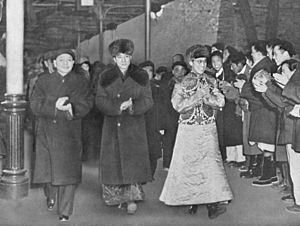
Deng supported Mao Zedong's "Anti-Rightist Movement" in 1957. He then became the General Secretary of the Secretariat. He helped manage the country's daily affairs with President Liu Shaoqi and Premier Zhou Enlai. Deng and Liu focused on economic development. This was a change from Mao's focus on political movements.
The economic failure of the Great Leap Forward (1958-1960) showed that Mao's economic plans were not working. Liu Shaoqi and Deng Xiaoping started to take charge of economic policy. Mao agreed to let Liu Shaoqi become the head of state.
In 1956, Deng supported removing references to "Mao Zedong Thought" from the party rules. In 1963, Deng went to Moscow for a meeting with Soviet leader Nikita Khrushchev. The meeting failed, and relations between China and the Soviet Union worsened.
Facing Purges During the Cultural Revolution
Mao feared that Deng and Liu's economic policies would bring back capitalism. So, in 1966, Mao started the Cultural Revolution. During this time, Deng lost his power and was forced to retire.
Deng and his family were targeted by the Red Guards. His eldest son, Deng Pufang, was badly injured and became paralyzed. In 1969, Deng Xiaoping was sent to work in a tractor factory in rural Jiangxi province. He spent four years there, writing in his spare time.
In 1971, Mao's chosen successor, Lin Biao, died. This left a power vacuum. Premier Zhou Enlai was ill with cancer. He wanted Deng to be his successor. In 1973, Deng returned to Beijing. Zhou convinced Mao to bring Deng back into politics. By 1974, Deng was the First Vice-Premier, effectively running daily affairs.
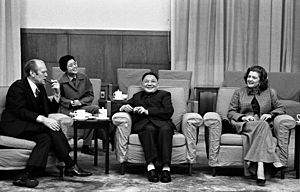
Deng tried to rebuild China's economy. However, the Cultural Revolution was still ongoing. A radical group called the Gang of Four, led by Mao's wife Jiang Qing, competed for power. They saw Deng as a threat. Mao also worried that Deng would undo the Cultural Revolution. Deng was asked to write self-criticisms, but he did not fully admit his policies were wrong. His disagreements with the Gang of Four grew.
When Zhou Enlai died in January 1976, Deng lost a key supporter. The Gang of Four, with Mao's approval, started a campaign to "Criticize Deng." Hua Guofeng was chosen as Zhou's successor instead of Deng.
In February 1976, Deng was officially removed from his political roles. He stayed home for months, waiting to see what would happen. The economic progress he had made was stopped. In April 1976, a large public mourning for Zhou Enlai turned into protests at Tiananmen Square. The Gang of Four blamed Deng for these events. Mao then removed Deng from all leadership positions, though he kept his party membership.
China's Leader
Becoming the Paramount Leader
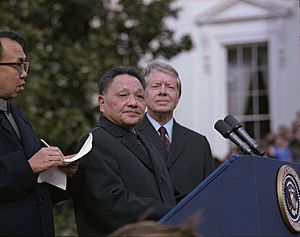
After Mao's death in September 1976, and the arrest of the Gang of Four, Hua Guofeng became the new leader. But Deng, by gathering support, slowly outmaneuvered Hua. By 1980, Hua was removed from his top positions. Unlike past power struggles, Deng allowed Hua to retire peacefully. This set a new rule that losing power would not mean harm.
During his time as China's most powerful leader, Deng held important roles. He was Chairman of the Chinese People's Political Consultative Conference (1978–1983) and Chairman of the Central Military Commission (1983–1990). Even after officially retiring in 1987 and 1989, Deng still had a lot of influence over China's policies until his death in 1997.
Important decisions were often made at Deng's home with a small group of senior party leaders called the "Eight Elders." Deng was the "paramount leader" even without holding the top party title. He was able to remove three party leaders during his time.
Bringing Order Back to China
Deng rejected the Cultural Revolution. In 1977, he started the "Beijing Spring," which allowed people to openly criticize the past. He also brought back the national college entrance exam. He removed the system that blocked people from jobs based on their family background.
Deng slowly gained more control. He encouraged public criticism of the Cultural Revolution. This weakened those who had gained power during that time. Deng also had strong public support. As Deng became more powerful, Hua Guofeng was replaced by Zhao Ziyang as premier in 1980. Then Hu Yaobang became party chairman in 1981. During this time, the Cultural Revolution was officially declared wrong. More than 3 million people who were wrongly accused were cleared.
Deng needed to address how Mao Zedong would be remembered. Deng wanted to make big reforms, so he couldn't continue Mao's strict policies. In 1982, the Communist Party said that Mao was a "great Marxist" and the founder of the country. They said his achievements were more important than his mistakes. Deng himself said Mao was "seven parts good, three parts bad." The party also blamed the Cultural Revolution on the "counter-revolutionary cliques" of the Gang of Four and Lin Biao, not just Mao.
China's Place in the World
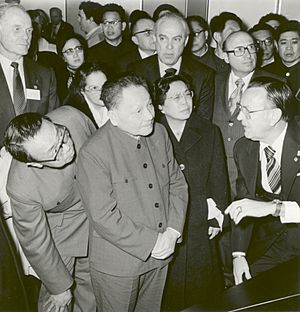
Deng focused on modernizing China and opening it to the world. He said China's goal was to have a peaceful environment for its "Four Modernizations." China started to learn from more advanced countries. Deng believed China should keep a low profile in foreign affairs. He wanted China to be independent from both the United States and the Soviet Union.
In late 1978, Deng visited Southeast Asian countries. He was very impressed by Singapore's economic growth. He later sent many Chinese people to study in Singapore and other countries. In 1979, the United States officially recognized the People's Republic of China.
In early 1979, Deng visited the United States. He met President Jimmy Carter. He also visited places like the Johnson Space Center in Houston. These visits showed that China's new focus was on economic and technological development. Deng personally handled the talks with the US to normalize relations.
Relations with Japan also improved. Deng saw Japan as a good example of fast economic progress. Relations with the Soviet Union improved after Mikhail Gorbachev became leader in 1985. Official relations were restored in 1989.
After the Tiananmen Square protests, Western countries placed sanctions on China. Deng then adopted a policy of "observe carefully, secure China's positions, calmly cope with challenges, hide China's capacities and bide its time, be good at maintaining a low profile, and never claim leadership." This meant China should focus on its own development and not seek to lead other countries.
Economic Reforms and Opening Up
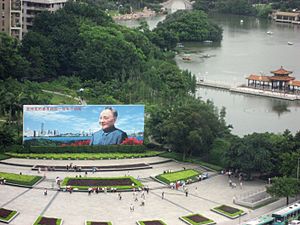
Deng famously said, "it doesn't matter whether a cat is black or white, if it catches mice it is a good cat." This meant that capitalist methods could be used if they helped China's economy. Deng worked with leaders like Zhao Ziyang and Hu Yaobang. He focused on the "Four Modernizations": economy, agriculture, science and technology, and national defense. He started an ambitious plan to open and liberalize the economy.
Deng took control of the Central Military Commission in 1981. He focused on modernizing the military. He cut 1 million troops in 1985. He wanted better-educated young people to join the army to handle advanced technology. He also focused on developing civilian science first.
In 1986, Deng explained that some people and regions could get rich first. This would help everyone become prosperous faster. By 1995, China had already achieved its goal of quadrupling its 1980 economy.
Deng's reforms were called Gaige Kaifang (Reforms and Openness). The goal was to make China a modern, industrial nation. He called his economic system "socialism with Chinese characteristics." He believed that "poor socialism" was not true socialism.
Deng was flexible about socialist ideas. He said, "We mustn't fear to adopt the advanced management methods applied in capitalist countries... Socialism and market economy are not incompatible." Many of the economic reforms were not Deng's original ideas. Local leaders often started them, and if they worked, Deng supported them and they were adopted nationwide. For example, the household responsibility system in farming was first tried by a poor village. It was very successful, and Deng supported it.
Deng's reforms led to an industrial revolution in China. He encouraged local areas to invest in profitable industries, especially light manufacturing. This helped China earn foreign money and reinvest in technology. China also increased foreign trade and bought machinery from Japan and the West. From 1980, Deng created Special Economic Zones to attract foreign investment.
The reforms also aimed to improve how much work people could do. New ways to reward workers were introduced. Rural markets were brought back, allowing farmers to sell their extra produce. This boosted agriculture and also helped industry grow.
Return of Hong Kong and Macau
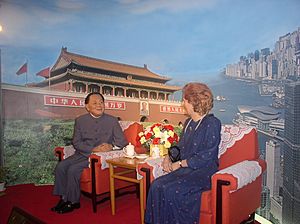
Deng led talks with the United Kingdom about the return of Hong Kong. He met with Prime Minister Margaret Thatcher. Deng insisted that all of Hong Kong would return to China. The Sino-British Joint Declaration was signed in 1984. It said that Hong Kong would return to China by 1997. China promised to respect Hong Kong's economic system and freedoms for 50 years.
Under pressure from China, Portugal agreed in 1987 to return Macau by 1999. This agreement was similar to the one for Hong Kong. These returns were based on Deng's idea of "one country, two systems." This idea allows different economic systems (communism and capitalism) to exist under one government. Deng also hoped this idea could be used for Taiwan in the future.
Tiananmen Square Protests
The 1989 Tiananmen Square protests were a series of demonstrations in Beijing. They began after the death of Hu Yaobang, a reformist leader. Many people were unhappy with the government and wanted more openness and less corruption. The protests grew, with many people gathering in Tiananmen Square.
On June 3-4, 1989, soldiers were sent into the city to end the protests. This resulted in many casualties. Many people in Beijing believed Deng ordered the action. However, it is not fully known who made the final decision. Deng's daughter said it was a group decision by the party leadership.
After the protests, the Communist Party tried to remove those who sympathized with the demonstrators. Deng made some concessions to hardliners. But he soon restarted his reforms after a tour of southern China in 1992.
Retirement and Later Influence
Deng officially retired from top positions in November 1989. Jiang Zemin became the new Chairman of the Central Military Commission. However, Deng was still seen as China's true leader. He was called the "chief architect of China's economic reforms." He set an example by retiring at an old age, breaking the tradition of leaders holding office for life.
Because of the Tiananmen protests, Deng's power was weakened. There were people in the Communist Party who opposed his reforms. To push his economic plans forward, Deng made a famous tour of southern China in 1992. He visited cities like Guangzhou and Shenzhen. This "Southern Tour" is seen as a very important moment in China's modern history. It helped save the economic reforms and kept society stable.
Death and Legacy
Deng Xiaoping died on February 19, 1997, at age 92. He had a lung infection and Parkinson's disease. The public was ready for his death, as his health had been declining. His funeral was a simple, private event. His organs were donated for medical research. His ashes were scattered at sea, as he wished. For weeks, Chinese media showed stories and documentaries about his life.
Deng's successor, Jiang Zemin, continued Deng's policies. Deng was praised as a "great Marxist" and the "great architect of China's socialist opening-up." Some people, however, had negative views. They criticized him for human rights issues and political violence.
Deng's death brought reactions from around the world. UN Secretary-General Kofi Annan called him a "primary architect of China's modernization." French President Jacques Chirac said few people had led such big changes. British Prime Minister John Major noted Deng's role in Hong Kong's return. The 14th Dalai Lama expressed regret that Deng died without resolving issues in Tibet.
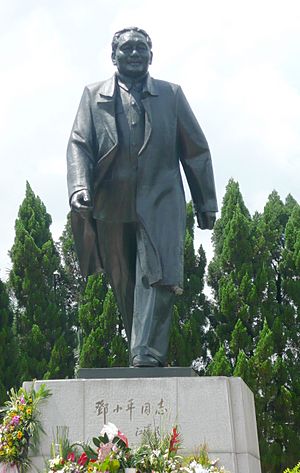
Memorials to Deng are not as grand as for other leaders. This fits his practical image. A bronze statue of Deng was put up in Shenzhen in 2000. It shows him confidently moving forward. Many Chinese leaders visit this statue. In coastal areas, billboards with Deng's image promote economic reform and "one country, two systems."
A bronze statue was also dedicated in his hometown of Guang'an, Sichuan, in 2004 for his 100th birthday. His former home in Sichuan is now a museum. In Bishkek, the capital of Kyrgyzstan, a boulevard is named after Deng Xiaoping.
What is Deng Xiaoping Remembered For?
Deng is called the "architect of contemporary China." He is one of the most influential figures of the 20th century. He was Time Person of the Year in 1978 and 1985.
Deng is mainly remembered for his economic reforms. These reforms moved China towards a market economy. They led to huge economic growth and improved the lives of hundreds of millions of people. China became more connected to the world economy. More people were lifted out of poverty under his leadership than at any other time. Some people think he should have won the Nobel Peace Prize. Deng is also credited with reducing the cult of Mao Zedong. He helped end the chaotic Cultural Revolution. His strong leadership kept China unified, unlike the Soviet Union, which collapsed.
However, Deng is also remembered for keeping a communist government in place. He is associated with the military action during the Tiananmen Square protests. He was also involved in some purges during Mao's rule. For example, he ordered a military action on a Muslim village in Yunnan, which resulted in many deaths.
As China's leader, Deng also negotiated the end of British rule in Hong Kong. He normalized relations with the United States and the Soviet Union. In 1980, he started political reforms by setting term limits for officials. He helped create China's nine-year compulsory education system.
Works
- Deng Xiaoping (1995). Selected Works of Deng Xiaoping: 1938–1965. I (2nd ed.). Beijing: Foreign Languages Press. ISBN 7-119-01456-0. http://book.theorychina.org/upload/7cd4c5b7-18a8-4058-bec6-f6994a51bf84/.
- — (1995). Selected Works of Deng Xiaoping: 1975–1982. II (2nd ed.). Beijing: Foreign Languages Press. ISBN 7-119-00167-1. http://book.theorychina.org/upload/70d42536-0801-4fb6-9fcc-af15777f9434/.
- — (1994). Selected Works of Deng Xiaoping: 1982–1992. III (1st ed.). Beijing: Foreign Languages Press. ISBN 7-119-01689-X. http://book.theorychina.org/upload/835b93ad-37d3-4c9c-8ba3-ca59badb506c/.
Images for kids
-
Deng Xiaoping billboard in Shenzhen, Guangdong
-
Deng Xiaoping billboard in Qingdao, Shandong
-
Deng Xiaoping billboard in Dujiangyan, Sichuan
See also
 In Spanish: Deng Xiaoping para niños
In Spanish: Deng Xiaoping para niños
- Chinese economic reform
- Historical Museum of French-Chinese Friendship
 | Ernest Everett Just |
 | Mary Jackson |
 | Emmett Chappelle |
 | Marie Maynard Daly |



